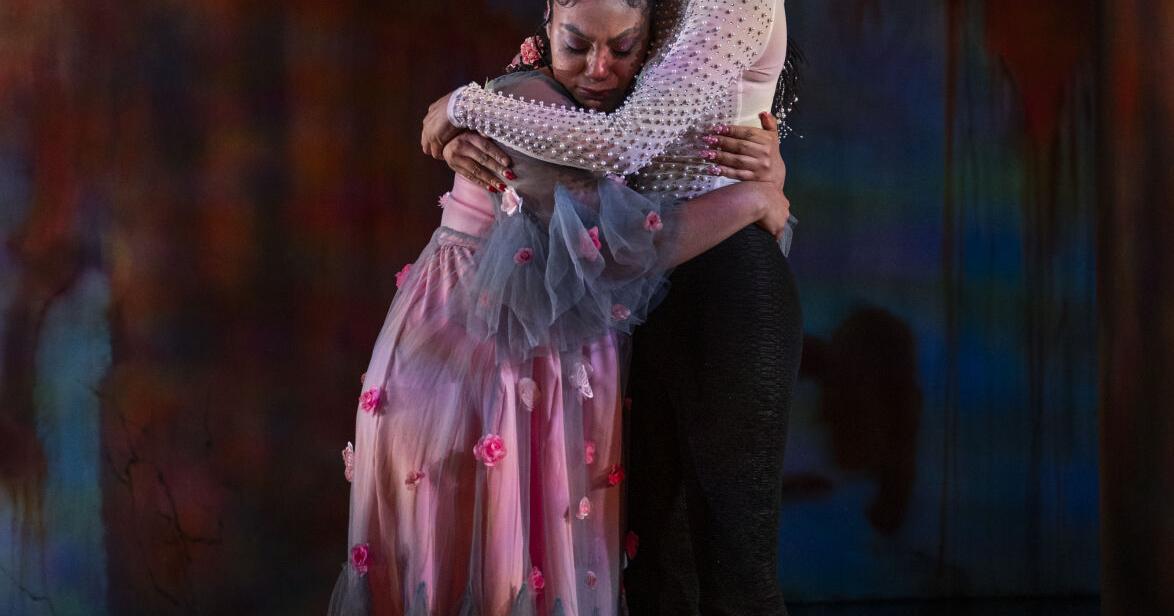
In her digital program notes for Court Theatre’s “Antigone,” director Gabrielle Randle-Bent, who is the theater’s associate artistic director and has been involved with the Oedipus trilogy since its inception in 2019, stresses that this play is for us. She explains that Court’s founding artistic director Nicholas Rudall “wrote this translation, on this campus, for this community. His tongue danced the dialogue, marrying his native Welsh, Ancient Greek, and the speech of 20th-century Bronzeville. It is a poetry that sings on this stage and resonates in these walls like nowhere else.” She also insists that the production “has been designed, staged, and is being performed” with us in mind.
Randle-Bent means this literally. Her many meticulous directorial decisions may come across as experimental but are more accurately described as “experiential.” They’re meant to immerse us in the world of the play and make us feel what the characters are feeling.
This is no easy task. While Sophocles’ “Antigone” has remained relevant for centuries because the moral questions retain their force, we’re used to looking at them from a distance. When Oedipus’ sons, brothers Eteocles and Polyneices, kill each other in civil war, and their uncle Creon, now king of Thebes, decrees that Eteocles, who backed the state, should be buried with all honors while the rebel Polyneices should be left out in the sun to rot, we know that making death the punishment for disobeying him is a bad idea. We also sympathize with Antigone’s determination to bury Polyneices on the grounds that the laws of the gods supersede those of man or the state, even though she knows the consequences. But our reactions are mostly intellectual, especially since the play is set up as a series of arguments with others trying to change her mind.
Randle-Bent’s efforts to tap into our emotions start with the physical staging. John Culbert’s scenic design features an undulating wall with a colorful abstract mural that vaguely resembles the continents, and Keith Parham’s lighting turns it into a canvas for larger-than-life shadows that often precede the characters’ appearances. One key scene takes place entirely in darkness to replicate, I think, how Antigone (Aeriel Williams) experiences entombment.
Willow James’ sound design and compositions range from ominous music to erratic noises from microphones as Antigone and Haimon (Matthew C. Yee), her fiancé and Creon’s (Timothy Eddward Kane) son, are entangled and roll around on the ground in flowing fabric resembling a wedding veil that becomes a shroud.
Raquel Adorno’s costume design doesn’t adhere to any time or place but rather reflects the characters. Antigone’s hip, sparkly attire contrasts with the frilly, flowered gown of her demure sister Ismene (Ariana Burks), who tries to dissuade her from her radical behavior. Creon’s gray suit, the pants tucked into black boots at one point, signal his status as a dictatorial bureaucrat. The prophet Tiresias (Cheryl Lynn Bruce) looks like she could have stepped out of a period movie about pilgrims. The Watchman Who Becomes Messenger (Julian Parker), an everyman who has the unwelcome task of reporting the unlawful burial to Creon and wants to make sure he’s not accused of doing anything wrong, wears yellow athletic wear and adds some needed humor.
Overseeing and commenting on the action, as well as filling in background, are a pair of poets, Demophilus (Danielle Davis) and Euboule (Cage Sebastian Pierre). Dressed in flowing black robes with silver fringes, they combine everything from poetry to hip-hop into a form that’s far more accessible to contemporary American audiences than the usual Greek chorus.
While Randle-Bent deserves high praise for her approach, and the acting is strong enough that we see nuances like Antigone’s pride in martyrdom and Creon’s pain when he realizes his mistakes too late, not all the innovations work. Sometimes, there’s too much manipulation of the environment and it would be better just to let the text speak for itself. Still, this “Antigone” is always interesting, and if it brings in new audiences, so much the better.
